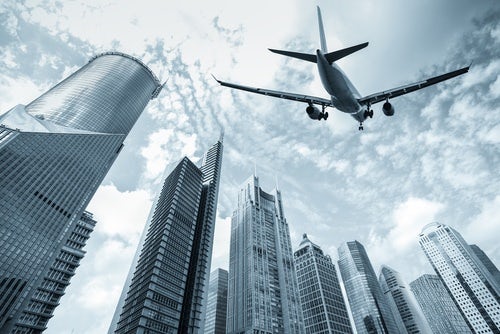
China already beats out the United States on exports and automobile market size, and now the country has done the same when it comes to business travel spending. Chinese corporate travellers spent more than $291 billion in 2015, roughly $1 billion more than U.S. corporate travelers during that same period. The Global Business Travel Association reports the gap is predicted to widen even further in 2016.
TRAVEL PROJECTIONS
Despite a decline in the Chinese economy over the past 12 months, the country’s business travel spending is flying high. Dozens of hotels and airports are expected to undergo construction throughout the country, marking a continuous investment in travel-related infrastructure.
China’s business travel spending is expected to increase 10 percent over the coming months, elevating the total spent on business travel to more than $320 billion. Business travel in the U.S. is forecast at a two percent growth rate, raising it from its current $290 billion to an estimated $295 billion.
TRAVEL SIGNIFICANCE
Industry insiders say China’s besting of the U.S. in business travel is a notable feat that truly illustrates to global nature of the current economy. Several hospitality firms have definitely taken notice, with plans to capitalise on China’s growing corporate travel market.
- Marriott International Inc. The hotel giant cemented a deal with the Chinese Eastern Crown Hotels Group to open more then 100 hotels across mainland China over a five-year period. The hotels will operate as part of Marriott’s mid-priced Fairfield brand.
- Avis Rent a Car system and Hertz Corp. Both car rental firms have secured deals with Chinese companies to expand their automobile rentals into the mainland.
Even though 95 percent of the China’s corporate travel spending is domestic, U.S.-based hotels have also implemented amenities and programs for Chinese travellers heading to international destinations.
Related: Rise of European Business Travel Expenses Spurs Economic Hope
Chinese guests who stay at participating Starwood Hotels & Resorts Worldwide or Hilton Hotels & Resorts are treated to rooms outfitted with slippers and a tea kettle, along with traditional Chinese breakfast options and Chinese-speaking employees.
Hilton’s program kicked off with 30 locations in 13 different countries, and has since grown to more than 120 resorts and hotels in more than 32 countries. Some of the big-name cities on the list include New York, San Francisco, Paris, London and Tokyo.
China-based airlines at Los Angeles International Airport have also noted an increase in passengers. Air China had 150,000 passengers heading out of LAX in 2012. That number increased to roughly 220,000 in 2015.
Search
Subscribe
Latest Posts
- 9 Signs it’s Time to Switch Expense Management Systems
- Gartner and Ardent Partners Advise How to Build a Best-in-class Accounts Payable Operation
- When Cash (Control) is King: Is Your Accounts Payable Strategy Optimised for a COVID-19 World?
- Getting the Most Out of Your Spend Data with Emburse Insight Advisor
- How We Did It: Supporting Front Line Healthcare Workers During the COVID-19 Outbreak
Posts by Category
Our choice of Chrome River EXPENSE was made in part due to the very user-friendly interface, easy configurability, and the clear commitment to impactful customer service – all aspects in which Chrome River was the clear winner. While Chrome River is not as large as some of the other vendors we considered, we found that to be a benefit and our due diligence showed that it could support us as well as any large players in the space, along with a personalized level of customer care.
We are excited to be able to enforce much more stringent compliance to our expense guidelines and significantly enhance our expense reporting and analytics. By automating these processes, we will be able to free up AP time formerly spent on manual administrative tasks, and enhance the role by being much more strategic.
